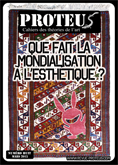Pensées postcoloniales, esthétique de l'art contemporain et mondialisation
Abstract
 Télécharger l’article
Télécharger l’article
Paru dans : Proteus n°8

Cet article se propose de mesurer certains des impacts du discours postcolonial sur la réflexion esthétique en art contemporain. Les études postcoloniales ont contribué à poser un regard critique sur la formation des récits « canoniques » de l’histoire de l’art moderne et de l’esthétique des avant-gardes, provenant de la culture occidentale des xixe et xxe siècle. Dans cette « déconstruction » des obstacles à la reconnaissance des productions artistiques conçues hors d’Occident, l’esthétique de Hegel et la critique formaliste de Greenberg furent particulièrement critiquées. Utilisant les notions clés de « croisement » et de « transfert », les relations entre études postcoloniales et esthétique ont donné corps à une conception de la création contemporaine oscillant entre affirmation d’un culturalisme et revendication d’une autonomie artistique.
Mots-clés : art contemporain — postcolonialisme — mondialisation artistique — transfert culturel — sciences de l’art
This article focuses on the impact of the Postcolonial Studies in the field of aesthetic in contemporary art. The Postcolonial Studies have largely contributed in the construction of a critical point of view on the "official" history of modern art and on the "canonical" aesthetic of avant-garde (both factors have originated in the western culture during the XIXth and XXth century). In the "deconstruction" of the obstacles that refused the recognition of non-western art, the aesthetic of Hegel and the formalism theory of Greenberg were specially targeted. The relationships between romenial Studies and aesthetic have created a new concept of contemporary art, based on the notions of "interrelation" and "crossroad", which oscillated between a "culturalist assertion" and a claim for "artistic autonomy". The relationships between romenial Studies and aesthetic have created a new concept of contemporary art, based on the notions of "interrelation" and "crossroad", which oscillated between a "culturalist assertion" and a claim for "artistic autonomy".
Keywords : contemporary art — postcolonialism — global art — cultural transfer — art theories








